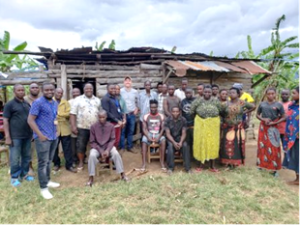Bridging the Geographic Divide for Access to Finance in Tanzania
F2F Volunteer Improves Financing Opportunities and Unlocks Capital for Rural Farmers to Improve Production and Increase Incomes
Although the area around Usangu basin in the Mbeya region of Tanzania is well known for its suitability for rice paddies, farmers like 31-year old Atanas Kikwembe were unable to maximize their production and improve their livelihoods. Atanas farmed for ten years in Ubaraku village Mbarali district on five to ten acres of land with an average yield of 100 to 150 bags of paddy rice (16 bags/acre). Although he owned 100 acres of land and had been trained in improved farming practices like many farmers in the area, Atanas was only producing for subsistence as he had limited access to finance to increase his production. Despite the high demand and need for financing, many banks, including AccessBank Tanzania, were servicing less than 1% of the potential customers in this fertile agriculture region of the country.

F2F volunteer Skye Root with farmers at Kiwira village of Rungwe District in Mbeya.
To address the challenge faced by Atanas and other farmers in the region, IESC’s Farmer-to-Farmer (F2F) Access to Finance Program mobilized volunteer expert Mr. Skye Root in October 2019 to conduct an assessment for AccessBank to better understand the specific financial needs of farmers and provide recommendations for the bank to reach and provide services to underserved and rural farmers. Capitalizing on his real-world experience in agribusiness and finance, Skye recommended that AccessBank expand their geographic footprint by removing the bank’s limitation to only lend within a 50km radius of a bank branch. With this policy constraint removed, Skye then facilitated linkages with farmers ready to borrow, such as the Ubaruku and Songwe Farmers’ Group (UBASO), which was located 200km from a bank branch, and generated a proof of concept for the bank. Skye also recommended that the bank automate and digitize its loan process to decrease the paper demands for the loan application process as a complement to removing the physical constraint. Additionally, he recommended moving bank resources, such as loan officers, from headquarters to satellite branches, such as the one in Mbeya, to better serve their agro-customers.
After seeing the positive results from the corresponding pilot based on Skye’s concept and recommendations, AccessBank continued lending to customers in more distant rural locations. Ultimately, AccessBank increased the size of their agro-loan portfolio in Mbeya from 61 loans in 2019 to 148 and counting for the 2020 growing season with a successful repayment rate of 90% despite the impact of the COVID-19 pandemic. With this new access to finance, farmers and farmers’ groups in this fertile agricultural region are using the capital to unleash productivity and increase their incomes.
Through his meeting with Skye, Atanas and fellow UBASO group members learned about available financing opportunities from AccessBank for the first time. Atanas noted, “I followed up and after expressing myself, the bank director Mr. Prosper, the Mbeya branch manager, and other two staff visited me. Upon evaluation, they loaned me TZS 18 million that enabled me to put 68 of my 100 acres under crop. I was able to purchase improved seeds and employ over 12 casual laborers for my farm operations and adhere to improved farming practices.” Despite the heavy rains this season, which flooded 18 of his 68 acres, Atanas was still able to harvest 1,119 bags (23 bags/acre) from the 50 remaining acres, exceeding his target by 95%.
From his new income, Atanas has not only repaid 75% of his loan, but also purchased a power tiller, which is already proving to be a valuable investment for himself, his family and his community. “This power tiller has helped with the transportation of 880 bags from the farm to a storage facility. I also rent it to provide services to other farmers in the village where I earn up to TZS 150,000, enough to cater to some of my family needs,” says Atanas. Atanas plans to continue to improve his yield and livelihood by utilizing all 100 acres next season and eventually obtaining his own storage facility and rice milling machine. For the additional capital needed to realize these goals and his potential, Atanas will once again tap into the financial services now available through AccessBank due to the support of the F2F program.
The American people, through the U.S. Agency for International Development, have provided economic and humanitarian assistance worldwide for more than 50 years.
The John Ogonowski and Doug Bereuter Farmer-to-Farmer Program (F2F) provides technical assistance from U.S. volunteers to farmers, farm groups, agribusinesses and other agriculture sector institutions in developing and transitional countries with the goal of promoting sustainable improvements in food security and agricultural processing, production and marketing.


